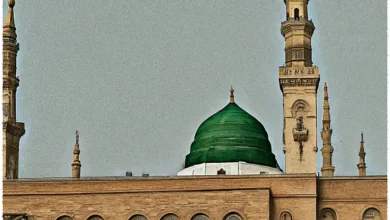Assalāmu Alaykum Warahmatullāh Wabarakātuh
Allāh ta’ālā said:
ولتكن منكم أمة يدعون إلى الخير ويأمرون
بالمعروف وينهون عن المنكر وأولئك هم المفلحون
“And let there be a band from among you whose task is calling toward Khayr, Commanding Ma’aruf and forbidding Munkar. And these are the People who have succeeded.”
The Ulamā have stated that this verse refers to the obligation of Da’awah in the Ummah and that it is a proof that the work of Da’awah is a Fard Kifāyah. Once a band of the Ummah is involved in it, the obligation is lifted from the others. While describing these people in his Tafsīr, Ibn Kathīr – rahima-hullāh – said:
“And if no one is doing it in the Ummah, then the entire Ummah is sinning”
“What is meant is:
: منتصبة للقيام بأمر الله ، في الدعوة إلى الخير”
“Who are tasked with the responsibility of standing to the Commandment of Allāh in calling to Khayr”
It means they spend their entire time, energy and effort in its purpose. This is very important to note. It means their concerns morning and evening is nothing but this task.
Brothers, been tasked means taking it as important as an employment is taken. That is because the Mujāhidūn sacrifice their time, energy, strength, body and soul in protecting the realm of Islām from the enemies of the Dīn, and for the safety of mankind from the piths of Kufr and Shirk, into Tawhīd and Īmān: this is the highest if Khayr to which they call.
Ad-Dahhāk said:
“These people are the Mujāhidīn and the Ulamā”
This is Al-Amr Bi Al-Ma’aruf and An-Nahy ‘an Al-Munkar. Bārakallāhu fīkum. And because the Ulamā sacrifice their time, effort, day and night to learning and teaching, educating the Ummah on that which is right and that which is wrong.
The verse also shows us what is meant by Da’awah
Allāh ta’ālā said:
1. Al-Khayr
2. Al-Amr Bi Al-Ma’aruf and An-Nahy ‘an Al-Munkar
Allāh refers to two responsibilities with which these People are tasked. Whereas the Muhaqqiqūn among the People of Tafsīr explained that they are different. Some of the Mufassirūn explained that “Al-Amr bi Al-Ma’aruf Wa An-Nahy ‘an Al-Munkar” mentioned in the verse is a further explanation of the Khayr to which they call.
This tafsīr implies that 1 and 2 above means one and the same. As for calling to Khayr, it means calling toward Tawhīd and Imān with tongue, limbs, body and soul. It implies waging Jihād in the Path of Allāh. It implies inviting the People who are not Muslim into Islām, to uproot every system of government that rules with other than the Law of Allāh, to protect the realm of Islām and to save humanity from the oppression of man-made laws that usurp the prerogative of Allāh to make laws.
It is what is meant by the Companion Rub’ī Ibn ‘Āmir – radiyallāhu anhu – when he said to the Persian General Rustum on the eve of the great Qādisiyyah battle:
الله ابتعثنا لنخرج من شاء من عبادة العباد إلى عبادة الله، ومن ضيق الدنيا إلى سعتها، ومن جور الأديان إلى عدل الإسلام، فأرسلنا بدينه إلى خلقه لتدعوهم إليه، فمن قبل ذلك قبلنا منه ورجعنا عنه، ومن أبى قاتلناه أبدا حتى نفضي إلى موعود الله
“Allāh sent us to take whomsoever He wills from the Ibādah rendered to ‘Ibād to ‘Ibādah rendering to Allāh, from the pressures of this Dunya to its spaciousness, and from the oppression of the diverse religions to the Justice of Islām. Thus He sent us with His Dīn to His Creation that we may call them toward it. Thus whomsoever of them accepts it from us, we accept that from him and let him be, and whosoever refuses that, we continue to fight him until we reach that with which Allāh promised.”
This encounter was mentioned by Imām Ibn Kathīr – rahimahullāh – in Al-Bidāyah Wa An-Nihāyah
The People whom they are commanded to fight are those Governments and Rulers that hinder people from seeing the light of Allah’s message. The work then of the People of Islām is to take people away from these compulsions to the spaciousness and justice that Islām has come with.
Whereas, Al-Amr Bi Al-Ma’arūf Wa An-Nahy ‘an Al-Munkar as in purpose 2 above refers to sanitizing the Muslim societies, the work of Hizbah, encouraging them to the doing of Good, remaining upon the Commands of Allah and fleeing from the wrath-places of Allāh.
Its just like Imām Ad-Dahhāk – rahimahullāh – said in the above that they were the Mujāhidūn and the Ulamā
For this reason, some of the Ulamā hold that Al-Amr bi Al-Ma’arūf and An-Nahy ‘an Al-Munkar is the word used for propagation of Islām, teaching and so on to Muslims whereas Da’awah entails only the calling of non-Muslims into Islām by either word of mouth, writing or waging Jihād.
This second Tafsīr is closer to the Truth, Allāhu A’alam and that which is stronger, and Allāh knows best, is that Da’awah entails the two purposes and goals mentioned above.
Allāh concludes the verse by mentioning that this band of people in the Ummah are the People of success.
“These are the Successful ones” in the verse implies that an Ummah that has this band of people among it is a successful Ummah. Success meant here includes that of the Dunya and the Ākhirah. But don’t forget that they have sacrificed their pursuit of the goods of this Dunya for this cause. Yet they are referred to as being successful in this Dunya.
Why? Because they become free from the complications and shackles of the pursuit of the Dunya and are safe from its burdens and caprices. Then Allāh provides them of the provisions of this world that which suffices them and fills their hearts with contentment, satisfaction, happiness and a yearn for the Ākhirah. This is very true.
Some of the Mufassirūn, from among the Intelligent say: For in several places in the Qur’ān Allāh referred to this fact and reality that a society is saved so often times by virtue of the People of good in it. A people who spend their time pondering over the ills of that society and preferring solutions. Example, He – ta’ālā – said:
وَلَوْ أَنَّ أَهْلَ ٱلْقُرَىٰٓ ءَامَنُواْ وَٱتَّقَوْاْ لَفَتَحْنَا عَلَيْهِم بَرَكَٰتٍۢ مِّنَ ٱلسَّمَآءِ وَٱلْأَرْضِ وَلَٰكِن كَذَّبُواْ فَأَخَذْنَٰهُم بِمَا كَانُواْ يَكْسِبُونَ
“And had the People of the cities believed in full and feared (Allāh), then we would have opened upon them blessings from the Heavens and the earth. But they belied (Our Warnings) by virtue of that which their hands did”
And Barakāt from the earth means the flourishing of the land with crops, fruits, vegetables, good pasture and that filled with comfort and harmony. The Mufassirūn explained that Barakāt from the Heavens meant rain and abundant rain. A rain that is nourishing, good for man, land and creation, full of abundance and bliss. That would have been the result of their belief if only they had believed.
Some of the Ulamā mentioned that it wasn’t just for belief, but for the efforts of the People of Da’awah
Also Allāh – ta’ālā – also said:
وَلَوْ أَنَّهُمْ أَقَامُوا التَّوْرَاةَ وَالْإِنْجِيلَ وَمَا أُنْزِلَ إِلَيْهِمْ مِنْ رَبِّهِمْ لَأَكَلُوا مِنْ فَوْقِهِمْ وَمِنْ تَحْتِ أَرْجُلِهِمْ ۚ مِنْهُمْ أُمَّةٌ مُقْتَصِدَةٌ ۖ وَكَثِيرٌ مِنْهُمْ سَاءَ مَا يَعْمَلُونَ
“And had they established the Tawrah and the Injīl and implemented that which was sent down to them from their Lord, then they would have eaten from above them and from beneath them. Of them were a People who were upright but many of them, evil was that which they perpetrated.”
Ibn Kathīr said the word ‘Muqtasidah’ implies that they were balanced. Neither extreme nor lax. But what they lacked was a people that called upon the society for rectitude that kept unto the commandment in the verse :
فَلَوْلَا كَانَ مِنَ الْقُرُونِ مِن قَبْلِكُمْ أُولُو بَقِيَّةٍ يَنْهَوْنَ عَنِ الْفَسَادِ فِي الْأَرْضِ إِلَّا قَلِيلًا مِّمَّنْ أَنجَيْنَا مِنْهُمْ ۗ وَاتَّبَعَ الَّذِينَ ظَلَمُوا مَا أُتْرِفُوا فِيهِ وَكَانُوا مُجْرِمِينَ
“And why was there not, in the generations that preceded you, a People of Merit who forbade that corruption be sowed in the earth. Only a few (Generations) did and whom We saved from among them (from Our punishment when it came). And the People of Oppression followed their sins in that pattern and they were criminals.”
Imām Tāhir Ibn Āshūr Al-Mālikī – rahimahullāh – said that the “people whom We saved” are the generations that had in them ‘Ulū Baqiyyah‘ (People of Merit) and had with them the two goals mentioned in them as we have explained above.
They called people into Īmān, and then continued to command people to Istiqāmah in it and standing by the commands of Allāh
Even non-Muslims with a thinking from Paganistic Cultures and Civilizations agree that a society is doomed if it does not have in it thinkers, teachers and callers to good. It is a Universal Truth, not only established by our Ulama that Societies are saved and taken forward by virtue of the thinkers and deeply dedicated persons in them who ponder over their situation, call for their rectitude and warn against pervasion. The Philosopher Socrates mentioned something to this regard in the Utopia as was attributed to him by Plato his student and co.
The question that then reads itself out is do we have in this society of ours a People given to this?
Brothers, I leave these questions to you brothers. Do we have in this society of ours a People who have taken this task upon themselves? Sacrificing their days, nights, efforts, body and soul toward achieving the two objectives, goals and purposes of Da’awah?
But what is apparent is that even those who claim they are upon the Path of Da’awah do not know or understand what it means in its toto and take it as a means of getting connected and enriched in the human pursuit of popularity and fame.
Jazākumullāhu Khayran. Bārakallāhu fīkum
Please read well and ponder that you may be praise worthy. This is the end of Topic One




